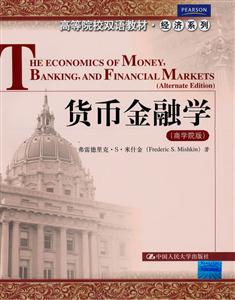包郵 貨幣金融學(xué)(商學(xué)院版)(高等院校雙語教材·經(jīng)濟(jì)系列)
-
>
以利為利:財(cái)政關(guān)系與地方政府行為
-
>
立足飯碗 藏糧于地——基于中國(guó)人均耕地警戒值的耕地保護(hù)視角
-
>
營(yíng)銷管理
-
>
茶葉里的全球貿(mào)易史(精裝)
-
>
近代華商股票市場(chǎng)制度與實(shí)踐(1872—1937)
-
>
麥肯錫圖表工作法
-
>
海龜交易法則
貨幣金融學(xué)(商學(xué)院版)(高等院校雙語教材·經(jīng)濟(jì)系列) 版權(quán)信息
- ISBN:9787300120829
- 條形碼:9787300120829 ; 978-7-300-12082-9
- 裝幀:一般膠版紙
- 冊(cè)數(shù):暫無
- 重量:暫無
- 所屬分類:>>
貨幣金融學(xué)(商學(xué)院版)(高等院校雙語教材·經(jīng)濟(jì)系列) 本書特色
《貨幣金融學(xué)(商學(xué)院版)》是高等院校雙語教材·經(jīng)濟(jì)系列。
貨幣金融學(xué)(商學(xué)院版)(高等院校雙語教材·經(jīng)濟(jì)系列) 內(nèi)容簡(jiǎn)介
本書是米什金傳統(tǒng)的《貨幣金融學(xué)》(第八版)的替代版本,是主要為商學(xué)院學(xué)生教學(xué)而寫的。在寫作本書時(shí),作者除保留了傳統(tǒng)版本中的核心內(nèi)容外,還根據(jù)商學(xué)院的教學(xué)特點(diǎn)進(jìn)行了適當(dāng)?shù)脑鲅a(bǔ)和刪減。與傳統(tǒng)版本相比,本書在講述金融機(jī)構(gòu)的部分,除了繼續(xù)保留非銀行金融機(jī)構(gòu)、金融衍生工具等有關(guān)章節(jié)外,還特設(shè)專章詳述金融行業(yè)的利率沖突;但刪除了講述is—lm模型和理性預(yù)期的政策含義的有關(guān)章節(jié)。
對(duì)于那些具備中級(jí)宏觀經(jīng)濟(jì)學(xué)知識(shí),希望把更多精力集中在金融方面,而不太關(guān)注貨幣理論研究的讀者,本書非常適合。
本書配有內(nèi)容豐富的網(wǎng)上教學(xué)資源庫(kù),讀者可填寫書后的《教學(xué)支持服務(wù)表》獲取相關(guān)資源。
貨幣金融學(xué)(商學(xué)院版)(高等院校雙語教材·經(jīng)濟(jì)系列) 目錄
第1章 為什么研究貨幣、銀行與金融市場(chǎng)
第2章 金融體系概覽
第3章 什么是貨幣?
第2篇 金融市場(chǎng)
第4章 理解利率
第5章 利率行為
第6章 利率的風(fēng)險(xiǎn)結(jié)構(gòu)與期限結(jié)構(gòu)
第7章 股票市場(chǎng)、理性預(yù)期理論與有效市場(chǎng)假定
第3篇 金融機(jī)構(gòu)
第8章 金融結(jié)構(gòu)的經(jīng)濟(jì)學(xué)分析
第9章 銀行業(yè)與金融機(jī)構(gòu)的管理
第10章 銀行業(yè):結(jié)構(gòu)與競(jìng)爭(zhēng)
第11章 銀行監(jiān)管的經(jīng)濟(jì)學(xué)分析
第12章 非銀行金融機(jī)構(gòu)
第13章 衍生金融工具
第14章 金融行業(yè)的利率沖突
第4篇 中央銀行與貨幣政策操作
第15章 中央銀行的結(jié)構(gòu)與聯(lián)邦儲(chǔ)備體系
第16章 多倍存款創(chuàng)造和貨幣供給過程
第17章 貨幣供給的決定因素
第18章 貨幣政策工具
第19章 中央銀行的職責(zé)是什么?貨幣政策目標(biāo)、策略和戰(zhàn)略
第5篇 國(guó)際金融與貨幣政策
第20章 外匯市場(chǎng)
第21章 國(guó)際金融體系
第6篇 貨幣理論
第22章 貨幣需求
第23章 總需求與總供給分析
第24章 貨幣政策傳導(dǎo)機(jī)制的實(shí)證分析
第25章 貨幣與通貨膨脹
詞匯表
部分問答題和思考題答案
貨幣金融學(xué)(商學(xué)院版)(高等院校雙語教材·經(jīng)濟(jì)系列) 節(jié)選
《貨幣金融學(xué)(商學(xué)院版)》是米什金傳統(tǒng)的《貨幣金融學(xué)》(第八版)的替代版本,是主要為商學(xué)院學(xué)生教學(xué)而寫的。在寫作《貨幣金融學(xué)(商學(xué)院版)》時(shí),作者除保留了傳統(tǒng)版本中的核心內(nèi)容外,還根據(jù)商學(xué)院的教學(xué)特點(diǎn)進(jìn)行了適當(dāng)?shù)脑鲅a(bǔ)和刪減。與傳統(tǒng)版本相比,《貨幣金融學(xué)(商學(xué)院版)》在講述金融機(jī)構(gòu)的部分,除了繼續(xù)保留非銀行金融機(jī)構(gòu)、金融衍生工具等有關(guān)章節(jié)外,還特設(shè)專章詳述金融行業(yè)的利率沖突;但刪除了講述IS-LM模型和理性預(yù)期的政策含義的有關(guān)章節(jié)。對(duì)于那些具備中級(jí)宏觀經(jīng)濟(jì)學(xué)知識(shí),希望把更多精力集中在金融方面,而不太關(guān)注貨幣理論研究的讀者,《貨幣金融學(xué)(商學(xué)院版)》非常適合。《貨幣金融學(xué)(商學(xué)院版)》配有內(nèi)容豐富的網(wǎng)上教學(xué)資源庫(kù),讀者可填寫書后的《教學(xué)支持服務(wù)表》獲取相關(guān)資源。
貨幣金融學(xué)(商學(xué)院版)(高等院校雙語教材·經(jīng)濟(jì)系列) 相關(guān)資料
插圖:High employment is a worthy goal for two main reasons: (1) the alternative situation——high unemployment——causes much human misery, and (2) when unemployment is high, the economy has both idle workers and idle resources (closed factories and unused equipment), resulting in a loss of output (lower GDP).Although it is clear that high employment is desirable, how high should it be? At what point can we say that the economy is at full employment? At first, it might seem that full employment is the point at which no worker is out of a job——that is, when unemployment is zero. But this definition ignores the fact that some unemployment, called frictional unemployment, which involves searches by workers and firms to find suitable match ups, is beneficial to the economy. For example, a worker who decides to look for a better job might be unemployed for a while during the job search. Workers often decide to leave work temporarily to pursue other activities (raising a family, travel ,returning to school), and when they decide to reenter the job market, it may take sometime for them to find the right job. Another reason that unemployment is not zero when the economy is at full employment is structural unemployment, a mismatch between job requirements and the skills or availability of local workers. Clearly, this kind of unemployment is undesirable. None the less, it is something that monetary policy can do little about. This goal for high employment is not an unemployment level of zero but a level above zero consistent with full employment at which the demand for labor equals the supply of labor. This level is called the natural rate of unemployment.
貨幣金融學(xué)(商學(xué)院版)(高等院校雙語教材·經(jīng)濟(jì)系列) 作者簡(jiǎn)介
弗雷德里克·S·米什金(Frederic S.Mishkin)是哥倫比亞大學(xué)研究生學(xué)院研究銀行和金融機(jī)構(gòu)的艾爾弗雷德·勒納教授。他還是國(guó)家經(jīng)濟(jì)研究局的助理研究員。自1976年于美國(guó)麻省理工學(xué)院獲經(jīng)濟(jì)學(xué)博士學(xué)位以來,他曾先后執(zhí)教于美國(guó)芝加哥大學(xué)、西北大學(xué)、普林斯頓大學(xué)和哥倫比亞大學(xué),他還是中國(guó)人民大學(xué)的名譽(yù)教授。1994—1997年,他擔(dān)任過美國(guó)紐約聯(lián)邦儲(chǔ)備銀行研究部執(zhí)行副主席和主任,是聯(lián)邦公開市場(chǎng)委員會(huì)的助理經(jīng)濟(jì)學(xué)家。
- >
隨園食單
- >
中國(guó)歷史的瞬間
- >
新文學(xué)天穹兩巨星--魯迅與胡適/紅燭學(xué)術(shù)叢書(紅燭學(xué)術(shù)叢書)
- >
名家?guī)阕x魯迅:故事新編
- >
上帝之肋:男人的真實(shí)旅程
- >
企鵝口袋書系列·偉大的思想20:論自然選擇(英漢雙語)
- >
月亮虎
- >
李白與唐代文化
-
金融市場(chǎng)技術(shù)分析-期(現(xiàn))貨市場(chǎng).股票市場(chǎng).外匯市場(chǎng).利率(債券)市場(chǎng)之道
(美)約翰·墨菲 著,丁圣元 譯¥45¥80



















